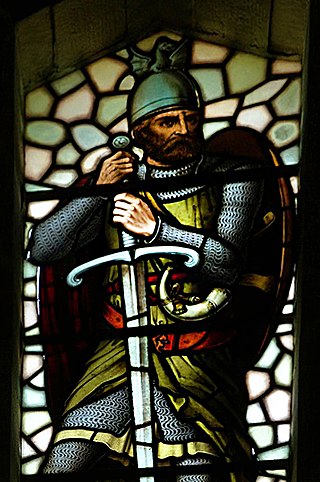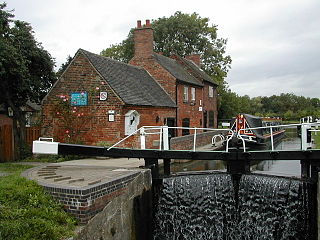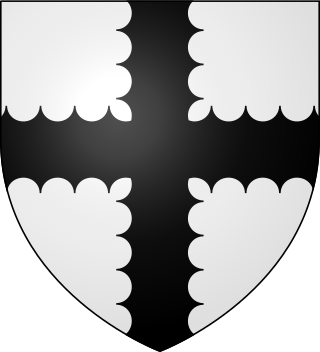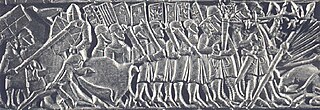Related Research Articles

Magna Carta Libertatum, commonly called Magna Carta or sometimes Magna Charta, is a royal charter of rights agreed to by King John of England at Runnymede, near Windsor, on 15 June 1215. First drafted by the Archbishop of Canterbury, Cardinal Stephen Langton, to make peace between the unpopular king and a group of rebel barons, it promised the protection of church rights, protection for the barons from illegal imprisonment, access to swift and impartial justice, and limitations on feudal payments to the Crown, to be implemented through a council of 25 barons. Neither side stood by their commitments, and the charter was annulled by Pope Innocent III, leading to the First Barons' War.

Sir William Wallace was a Scottish knight who became one of the main leaders during the First War of Scottish Independence.

The Battle of Stirling Bridge was fought during the First War of Scottish Independence. On 11 September 1297, the forces of Andrew Moray and William Wallace defeated the combined English forces of John de Warenne, 6th Earl of Surrey, and Hugh de Cressingham near Stirling, on the River Forth.

Earl of Derby is a title in the Peerage of England. The title was first adopted by Robert de Ferrers, 1st Earl of Derby, under a creation of 1139. It continued with the Ferrers family until the 6th Earl forfeited his property toward the end of the reign of Henry III and died in 1279. Most of the Ferrers property and the Derby title were then held by the family of Henry III. The title merged in the Crown upon Henry IV's accession to the throne in 1399.
The Battle of Falkirk, on 22 July 1298, was one of the major battles in the First War of Scottish Independence. Led by King Edward I of England, the English army defeated the Scots, led by William Wallace. Shortly after the battle Wallace resigned as Guardian of Scotland.

Baron Strange is a title which has been created four times in the Peerage of England. Two creations, one in 1295 and another in 1326, had only one holder each, upon whose deaths they became extinct. Two of the creations, that of 1299 and that of 1628, are extant. The surname Le Strange was Latinized as Extraneus. The arms of Le Strange of Knockin Castle in Shropshire were: Gules, two lions passant argent.
Andrew Moray, also known as Andrew de Moray, Andrew of Moray, or Andrew Murray, was an esquire, who became one of Scotland's war-leaders during the First Scottish War of Independence. Moray initially raised a small band of supporters at Avoch Castle in early summer 1297 to fight King Edward I of England. He soon had successfully regained control of the north for the absent Scots king, John Balliol. Moray subsequently merged his army with that of William Wallace, and jointly led the combined army to victory at the Battle of Stirling Bridge on 11 September 1297. In the fighting at Stirling, Moray was severely wounded. He died at an unknown date and place that year.

Sandiacre is a village and civil parish in the borough of Erewash in Derbyshire, in the East Midlands region of England adjoining the border with Nottinghamshire. The population of the parish was 8,889 at the 2011 Census.

Sir Hugh de Cressingham was the treasurer of the English administration in Scotland from 1296 to 1297. He was an adviser to John de Warenne, 6th Earl of Surrey at the Battle of Stirling Bridge. He suggested a full-scale attack across the bridge, which cost the English the battle and led to his death.
William Bourne may refer to:

Sir William Douglas "le Hardi", Lord of Douglas was a Scottish nobleman and soldier.
The Justice of Chester was the chief judicial authority for the county palatine of Chester, from the establishment of the county until the abolition of the Great Sessions in Wales and the palatine judicature in 1830.

Baron of Roslin or Rosslyn was a Scottish feudal barony held by the St Clair or Sinclair family.
Events from the 1290s in England.
Events from the 1240s in England.
The Sheriff of Nottinghamshire, Derbyshire and the Royal Forests is a position established by the Normans in England.

The Franco-Flemish War was a conflict between the Kingdom of France and the County of Flanders between 1297 and 1305.

William de Vesci or Vescy was a prominent 13th-century noble. He was a son of William de Vesci and his second wife Lady Agnes de Ferrers, daughter of William de Ferrers, 5th Earl of Derby, and his first wife Sibyl Marshal.

John Harington, 1st Baron Harington (1281–1347) of Aldingham in Furness, Lancashire, was an English peer, created Baron Harington by writ of summons to Parliament dated 1326.
Events from the 1290s in the Kingdom of Scotland.
References
- ↑ Hutton, William (1 March 2019). "The History of Derby: From the Remote Ages of Antiquity to the Year MDCCXCI ... Also Its Ecclesiastical History, Trade, Amusements, Remarkable Occurrences, and Eminent Men ..." Nichols – via Google Books.